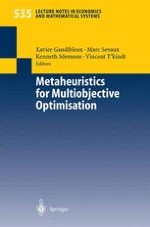2004 | Buch
Metaheuristics for Multiobjective Optimisation
herausgegeben von: Prof. Xavier Gandibleux, Prof. Marc Sevaux, Prof. Kenneth Sörensen, Prof. Vincent T’kindt
Verlag: Springer Berlin Heidelberg
Buchreihe : Lecture Notes in Economics and Mathematical Systems
Enthalten in: Professional Book Archive
